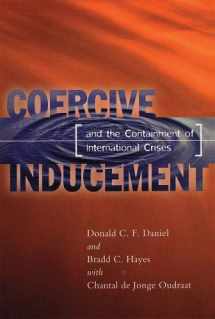
Coercive Inducement and the Containment of International Crises
Book details
Summary
Description
The concept of a “middle ground” between simple peace enforcement and traditional peacekeeping by lightly armed observers has been both ill defined and controversial. But the authors of this thoughtful yet challenging volume make a strong case for both the practicability and the desirability of such operations.
“Coercive inducement”―the term was suggested by Kofi Annan, when he was undersecretary general for peacekeeping―is a form of coercive diplomacy that relies more on the deployment and demonstration of military force than on the use of force per se. In the absence of such an option, the international community finds it hard to respond to a variety of crises, including ones that can spiral into genocide.
After first laying out general principles, the book explores four recent UN operations (in Somalia, Rwanda, Bosnia, and Haiti) in which coercive inducement was particularly relevant, and then presents operational guidelines for its use. Clear-sighted and pragmatic throughout, the authors conclude by suggesting when and to what extent the international community should commit itself to undertake coercive inducement.


We would LOVE it if you could help us and other readers by reviewing the book
Book review



